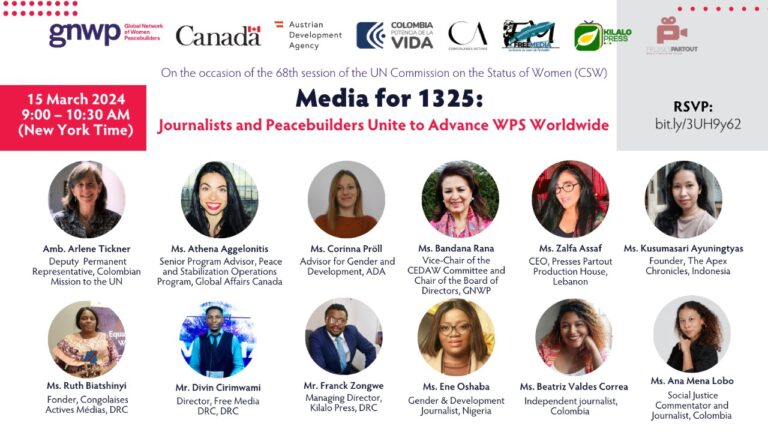Empowering Media for gender responsive peace reporting: A Comprehensive discussion of the 68th session of the UN Commission on the Status of Women (CSW)

In the ever-evolving landscape of global media, journalists wield immense influence not only in shaping public discourse but also in driving policy implementation. Their role in advocating for the Women, Peace, and Security resolutions (WPS) is particularly significant, ensuring that these vital frameworks resonate with local communities and hold governments accountable. However, despite the pivotal role of the media in building narratives, challenges persist, hindering effective gender-responsive and conflict-sensitive reporting.
The Global Network of Women Peacebuilders (GNWP) has emerged as a beacon of change in this arena, recognizing the urgent need to amplify voices often marginalized in mainstream discourse. Through its comprehensive Media and WPS program, GNWP has embarked on a transformative journey, training hundreds of journalists worldwide and fostering collaboration through national and regional competitions. The program aims not only to challenge entrenched stereotypes by highlighting women’s leadership and contributions to peace and security efforts.
Despite these commendable efforts, journalists continue to encounter barriers in their quest for gender-responsive reporting, particularly in grappling with conflict and post-conflict challenges. In Indonesia, for instance, the pervasive patriarchal culture perpetuates the glass ceiling phenomenon, where women face systemic obstacles in ascending to leadership positions within media organizations. This gender disparity not only skews the reporting lens, but also hampers efforts to present a comprehensive and inclusive narrative.
Beatriz Valdez Correa, the winner of the inaugural Global Media for 1325 and an independent journalist from Colombia, emphasized in her keynote speech the role of the media in promoting narratives that support women in peace efforts.
The first session, titled “The Time is Now: A Global call for gender-sensitive reporting in conflict and post-conflict affected regions,” featured presentations from leading media figures such as Zalfa Assaf from Press Partout Production House in Lebanon, Ruth Biatshinyi from Congolaises Active Media in DRC, and Ana Mena Lobo, a journalism students from Colombia. They described the journalist’s responsibility in producing empowering and survivor-centered content, as well as the role of media in supporting the localization of WPS resolutions.
Dr Solomiya Ivakhiv also performed a piece by Ukrainian female composer Hanna Havrylets. This musical performance served as a tribute to Ukrainian women who fell in the warmth while reminding of the power of art in advocating peace.
The second session, titled “We will keep publishing stories: Promoting Gender and Conflict-Sensitive Journalism and highlighting the work of media practitioners against adversity,” featured panelists from Indonesia, Nigeria and DRC. They shared their views on key elements often overlooked in conflict coverage, as well as the challenges of gender-responsive and conflict-sensitive reporting in their respective countries.
The founder of The Apex Chronicles, Kusumasari Ayuningtyas and a prominent Indonesian journalist, addressed these challenges head-on during a recent public event convened by GNWP. Ayuningtyas underscored the dual challenges of the glass-ceiling phenomenon and difficulties in finding women as top leaders and decision-makers to be a source.
“the glass ceiling phenomenon remains a formidable obstacle in Indonesia’s media landscape. Perpetuating gender disparities and limiting the perspectives presented to the public,” Ayuningtyas emphasized.
Despite the active involvement of female journalists, top leadership positions remain predominantly occupied by men, resulting in a skewed representation of issues and perpetuating masculine narratives. Furthermore, the challenge of limited sources particularly concerning national security issues. “Accessing diverse perspectives is essential for gender-balanced reporting,” she added.
This hybrid event attended by policymakers, media practitioners, and civil society representatives served as a platform for meaningful dialogue and collaboration. Through insightful discussions and thought-provoking exchanges, participants explored strategies to mainstream WPS and Youth, Peace and Security (YPS) resolutions at the local and national levels. By strengthening cooperation and identifying shared priorities, journalists and policymakers alike committed to addressing the persistent challenges associated with promoting and implementing WPS resolutions in their communities.
As the event drew to a close, Bandana Rana, Vice-Chair of the CEDAW committee and Chair of the Board of Directors of GNWP, offered closing remarks, underscoring the collective resolve to build a more inclusive and equitable media landscape. “Our journey towards gender-responsive and conflict-sensitive reporting requires sustained commitment and collaboration. Let us harness the power of the media to amplify diverse voices, challenge stereotypes, and pave the way for a more peaceful world,” she affirmed.
In conclusion, the path towards gender-responsive and conflict sensitive reporting is fraught with challenges, yet it is imbued with immense potential for transformative change. Through collective action, stakeholders can dismantle barriers, foster inclusive narratives, and pave the way for a more peaceful and equitable future. As journalists, policymakers, and advocates stand united in commitment to harnessing the power of media for positive social change.